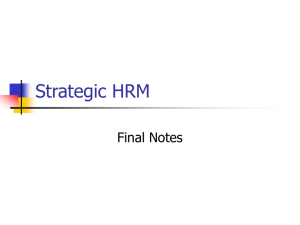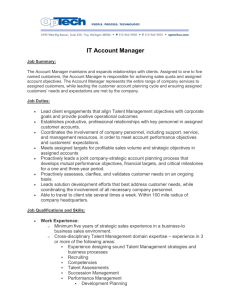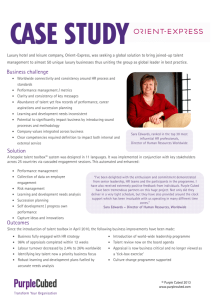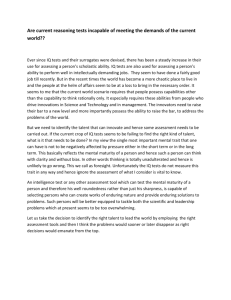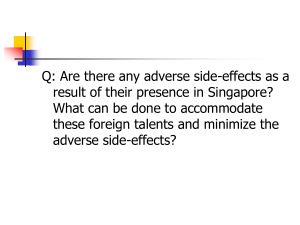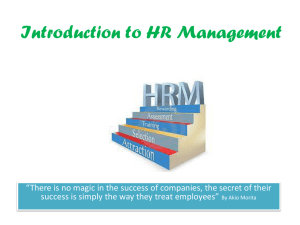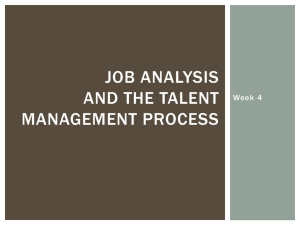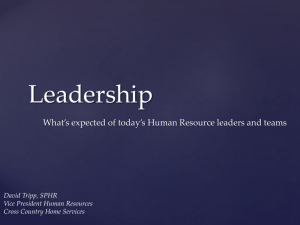Presentation
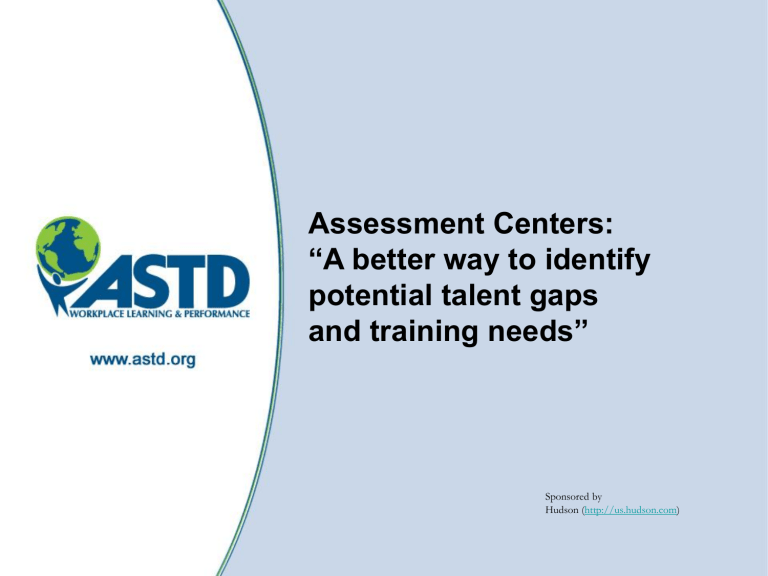
Assessment Centers:
“A better way to identify potential talent gaps and training needs”
Sponsored by
Hudson ( http://us.hudson.com
)
1
Who We Are?
Hudson is a leading provider of permanent recruitment, contract professionals and talent management solutions worldwide.
We help our clients achieve greater organizational performance by assessing, recruiting and developing the best and brightest people for their business.
The company employs approximately 3,600 professionals, speaking multiple languages in 25 countries, operating in four regions
(Americas, Europe, Asia, & Australasia).
http://us.hudson.com
2
Our Global Services
3
PERMANENT &
CONTRACT
RECRUITMENT
TALENT
MANAGEMENT
CONSULTING &
CONTRACT
PROFESSIONALS
4
Hudson Talent Management
Hudson’s Talent Management Solutions can be integrated into the recruitment process and HR initiatives to drive performance and align with the companies objectives.
Succession
Planning
Graduate
Recruitment
Hudson
Talent Management
Assessment &
Development
Centres
Leadership
Development &
Coaching
Performance
Management
Competency
Modeling
Hudson Assessment Suite
• Standardized global methodology supports pan-national projects
• One of the worlds largest talent management consultancies
• 400 experienced professionals across the globe
• Dedicated R&D Centers with highly skilled technical experts
• Hudson offers a comprehensive talent management and consulting service in assessment including:
•
•
•
•
•
•
Job & Competency Profiling
Psychological Assessment
Behavioural Assessment
Assessment and Development Centers
Competency Based Interviewing
Employee Assessment Surveys
5
Transforming Business
Performance
6
Hudson Research Programs
• Hudson is committed to the collection and publication of thorough intelligence on the forces that impact career decisions and business performance. Check out Market Insights at www.us.hudson.com
.
• In the past, we surveyed nearly 10,000 workers monthly to provide insight into a variety of workplace trends and issues. Our programs have included:
7
Trends & Topics Surveys
– Topics include aging workforce, work-life balance, absenteeism and more
In-Depth Research Initiatives & White Papers
– Retention Initiatives, Compensation & Benefits,
Pay & Performance, and Independent
Professionals
Labor Market
Who’s Got The Power?
Employers?
Employees?
8
5
Managing The Talent War
The war for talent exists, organizations need to address the workforce gaps and their future potential to remaincompetitive.
Issues that need to be addressed include:
• How do I find and grow my knowledge workers and leaders?
• How large is the gap between my needs and reality?
• Buying talent will not be sufficient as a solution to meet my business needs.
• Growing talent internally is key, but how?
• We must retain talent, but how?
9
Hudson Global HR Insight
In March/April 2009 Hudson conducted a global survey across
30 countries with HR leaders exploring how HR priorities and challenges have changed during the global economic downturn.
10
Key Findings:
• There has been a clear shift from talent attraction to talent engagement, organizational development and people development.
• 79% of North American companies reported that their HR strategy incorporates downsizing. Internal talent assessment is a key focus for 52% of these organizations
• Employees with the most potential will take care of the high impact roles and high value specialists to fulfill their complex jobs. A key question is: Do companies know where their high potentials are and what roles they can fit?
Winning The Battle For
Hearts And Minds
In order to achieve increased performance management must fully unlock the potential of their people.
• Organizations need to increase objectivity for internal promotion
• They need to minimize poor hiring decisions
• Identify high potentials for fast track development
• Utilize a consistent and reliable measurement of important competencies
• Create and deliver a powerful learning experience for participants
• Provide transparency, equal opportunity & fairness for all
11
“If you want 1 year of prosperity, grow grain.
If you want 10 years of prosperity, grow trees. If you want 100 years of prosperity, grow people.”
— Ancient Chinese Proverb
12
The Importance Of Career
Source : Hudson / Vlerick Hipo Research Study
Retention Factors
Career
Company culture
Impact / Change
Respect from others
Salary
3.6
3.7
3.8
3.9
4
Degree of importance
4.1
4.2
4.3
Projection within 5 years
Career
Impact / Change
Company Culture
Respect from others
Salary
3,6 3,7 3,8 3,9 4
Degree of importance
4,1 4,2 4,3
13
Identifying & Developing Top Talent
14
100
150
Average
Performer
Top
Performer
100
185
Average
Performer
Top
Performer
225
100
Average
Performer
Top
Performer
Productivity
Low Complexity Jobs
Productivity
Medium Complexity Jobs
Productivity
High Complexity Jobs
Journal of Applied Psychology
Clusters of HiPo Competencies
Research: University of Brussels
15
Teamwork
Performance Motivation
Delegation
Leadership
Impact
Creativeness
Company Identification
Flexibility
Vision
Cultural Awareness
Risk Taking
Feedback (searching for and using)
Performance Strategic Change
Competency Competency Competency
.854
.669
.690
.680
.596
.515
.861
.743
.693
.803
.755
.689
Through Principal Factor Analysis a cluster of three competencies was detected explaining 70% of variance between HiPo’s and others
Source : The Journal of Management Development
Increasing “Fit” To Drive
Performance & Retention
“ Could Do”
(With training & experience)
Abilities
& Aptitudes
Knowledge
& Skills
“ Can Do”
(Or has already done )
16
“ How They’ll Do It”
(How they approach work)
Personality
& Work Style
Preferences
& Values
“ Want To Do”
(Has interest or motivation to do)
Talent Assessment
• An important part of your overall talent management strategy is the development of the process organizations will use to evaluate performance and potential, and to identify future leaders, successors, and/or high potential employees.
17
• An effective talent assessment process should be:
– Consistent across your organization’s business units
– Aligned to your organization’s business needs and future leadership needs
– A multi-level process that involves several data points
– Well-defined and understood across the organization
• Assessment is often equated and confused with evaluation, but the two concepts are different. Assessment is used to determine what a person knows or can do, while evaluation is used to determine the worth or value of a course or program. Assessment data effects employee advancement, success and development
( Herman &
Knuth, 1991 ).
What Types of Assessment?
How can organizations assess existing staff to track high potentials and ensure new hires meet the future needs of the business?
Assessment:
• Online Psychometric Assessments
•
•
Leadership/Management Assessment Batteries
Assessment and Development Centers
•
•
360 degree feedback surveys and business assessments
Competency model profiling, behavioral based interviews, multi-rater assessment tools
18
Assessment Benchmarking
Define performance standards
Identify appropriate assessments
Identify incumbent sample
Gather performance data for each employee
Each employee completes assessment(s)
19
Match employees performance data with their assessment data
Statistically analyze data to determine which assessment(s) scale(s) predict on-the-job performance
Develop recommendations and plans regarding future assessment and selection
Assessment/Development Centers?
20
What is an assessment/development center?
An assessment/development center is a process designed to identify an individual’s strengths, weaknesses, and potential in a current or future role.
The assessment process is characterized by:
– Multiple participants rated by multiple assessors on several varied exercises
– Many of these exercises are designed to assess competencies
– Data integration: a structured evaluation of the participant in which assessors present objective evidence and reach a consensus decision
The outcome of an assessment/development center are:
– Written reports detailing a participant’s competencies as they relate to job requirements
– One-to-one sessions examining the reports
21
Why Assessment Centers?
• Combine multiple assessment and business simulation methodologies to achieve the best possible predictor of future performance
• Offers comprehensive secondary evaluation of preferred candidate strengths and weaknesses
• Are the most powerful tool to predict the profile you want to hire – save money over time
• Measure performance and potential therefore strengthening the leadership pipeline – allowing organizations to develop training strategies to further develop and grow talent
• Hiring managers can be involved and refresh their own assessment/coaching skills
• Offer broad range of competencies, individually or in group
• Provide wealth of information available to feedback to all involved
• Offers great opportunity to seal psychological contract
Assessment Centers Drive Performance
22
Competencies Questions
Technical Skills
Do they have the required technical skills?
Discipline Understanding
Knowledge & Experience
Capability
Demonstrated competencies
Attributes
Behaviours that infer potential
Drivers
Motivational Fit
Do they have the experience and understanding necessary?
Can they demonstrate the behaviours necessary for high performance?
Do they have development potential?
Will aspects of the role motivate them?
Career Fit
Does the role meet their current career objectives?
…and Tools To Assess Each Area
Technical Skills
Discipline Understanding
Knowledge & Experience
Capability
Demonstrated competencies
Attributes
Behaviours that infer potential
Motivational Fit
Career Fit
Resume Screening
Technical Tests
Preferential
Interviewing
Behavioural
Interviewing
Psych Assessment
Behavioural Interview
Preferential Interview
23
24
Assessment Centers
Advantage
• Most powerful tool to predict profile you hire – saves money over time
• Hiring managers can be involved and refresh their own assessment/coaching skills
• Performance and potential
• Broad range of competences, individually or in group
• Wealth of information available to feedback to all involved
• Offers great opportunity to seal psychological contract
Disadvantage
• Time investment required from candidate – though they get more in-depth feedback in return and can also make an informed decision
• Relatively expensive in short term – though saves money in the long run
Case Study A -
Assessment Center’s ROI In The Selection Process
25
Client Issue:
Very high personnel turnover
• Young graduates selection procedure
• Only one interview
• Or a full assessment center (interview, BAQ, RAT, simulation exercises, etc.)
AC Objective:
Reduce the turnover of personnel
• What is the percentage of ‘young graduates’ who left the company within the first 3 years?
• What is the difference between the young graduates who were selected versus an interview and the young graduates who were selected versus an AC?
Case Study A-
Assessment Center’s ROI In The Selection Process
26
43%
45%
40%
35%
30%
25%
20%
15%
10%
5%
25%
0%
The turnover of personnel was reduced by 41%.
AC
Interview
Case Study B –
Talent Management Assesses Future Leaders
27
Challenge
• The client, one of the world’s largest energy companies, had a program grooming high-potential employees for career advancement opportunities and broader leadership responsibilities.
• In 2008, the company revamped the process used to select employees for the program, making it more systematic and rigorous.
• As a result, the company needed a service provider with talent assessment expertise to evaluate candidates in the United
Kingdom, the United States and Asia.
• Hudson was selected as the company’s partner because of our robust methodology, global reach, the quality of our assessors and the cost-effectiveness of our offerings.
28
Case Study B –
Talent Management Assesses Future Leaders
Solution
• Hudson’s Talent Management team conducted a series of meetings to learn about the company’s culture, values and leadership framework. Based on that background, we developed assessment materials that were uniquely suited to the client’s leadership development program and trained our assessors to apply their high standards during interactions with candidates.
• In late 2008, we conducted assessments at three sites: London,
Houston and Singapore. Some candidates were at a relatively early stage in their career with the client, while others had already attained senior-level positions. The type of assessments administered varied accordingly.
• Overall, about 85 candidates went through a series of ability and personality tests, simulation exercises, business case studies, interviews and group discussions.
29
Case Study B -
Talent Management Assesses Future Leaders
Results
• Hudson provided comprehensive reports about the candidates’ aptitude for performing effectively in future leadership roles. Our guidance for the client throughout the process provided the company with useful information about tailoring their development efforts to ensure their high-potential employees can continue to progress throughout their careers.
• Candidates – many of whom had never been through an assessment program before – came away with a better understanding of their strengths, weaknesses and opportunities for personal development. Even those who did not make it into the leadership program found the experience valuable.
• The client was highly satisfied.
Summary
• Identifying talent is going to become more vital with the predicted skills shortage and therefore more science must be added to the selection process
• Although it may look like an additional cost, adding science to selection can save thousands in the future
• It is important to identify the right solution for your organization and the types of roles you hire
• Whatever you do, always start with the right competencies for each role and build from there
• Always remember, high potential is developed through a solid understanding of competency and behavior
30
Questions/Contacts
• Thank You
Simon Fenwick
General Manager, Talent Management
Simon.Fenwick@hudson.com
212-351-7249
31
